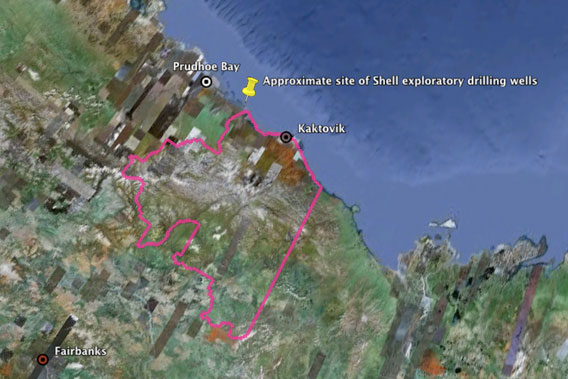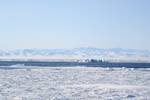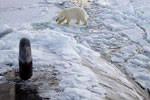
Approximate site of preliminarily approved drilling by Shell in the Chukchi Sea. Pink outline is the Arctic National Wildlife Refuge (ANWR). Image made with Google Earth.
With the approval of the Obama Administration, Royal Dutch Shell began drilling into the ocean floor of the Chukchi Sea off the coast of Alaska yesterday morning. The controversial operation, which has been vehemently opposed by environmental and Native groups, will likely only last a few weeks this year until the Arctic winter sets in. The U.S. government has said that Shell must complete operations by September 24th, however the oil giant has asked for an extension.
“We look forward to continued drilling progress throughout the next several weeks and to adding another chapter to Alaska’s esteemed oil and gas history,” Shell wrote in an online statement. ” We’re proud to be offshore Alaska, and we’re extremely proud of the preparation we’ve put in place to do it right.”
Extreme weather, floating ice, and remoteness are just a few of the challenges that faces any fossil fuel exploitation in the Arctic, and environmental groups say Shell hasn’t proven itself ready to drill safely. The oil giant, which spent $4 billion on Arctic oil drilling, has suffered costly and embarrassing delays all year, including an oil spill containment barge which is still harbored in Washington State and undergoing retrofitting.
For its part, the environmental group, Greenpeace, has been conducting a protracted, multi-pronged campaign against Shell and other fossil fuel companies in the Arctic. To date, the group has gathered 1.7 million signatures to declare a global sanctuary in the Arctic, which would prohibit oil drilling and industrial fishing.
Shell has succeeded in obtaining a restraining order against Greenpeace, fearing that the group will try to interrupt its oil operations as it has attempted with other companies.
Ironically, perhaps, the extent of Arctic ice reached a record low this year, several weeks ahead of the end of the summer melt season. Arctic seasonal ice is vanishing due to global climate change, which is caused by burning fossil fuels.
Related articles
Shell begins offshore drilling in the Alaskan Arctic
(09/10/2012) With the approval of the Obama Administration, Royal Dutch Shell began drilling into the ocean floor of the Chukchi Sea off the coast of Alaska yesterday morning. The controversial operation, which has been vehemently opposed by environmental and Native groups, will likely only last a few weeks this year until the Arctic winter sets in. The U.S. government has said that Shell must complete operations by September 24th, however the oil giant has asked for an extension.
Obama approves preparation for oil drilling in Arctic, Shell en route
(08/30/2012) In the same week that sea ice in the Arctic Ocean hit another record low due to climate change, the Obama Administration has given final approval to Royal Dutch Shell to prepare for exploratory drilling in the region. Vehemently opposed by environmentalists and indigenous groups, the drilling plans are a part of the Obama Administrations ‘all of the above’ energy policy. Whether or not Shell will actually drill a well this season, however, is still up in the air as its oil spill containment barge remains docked in Washington state for an upgrade that could last several days.
Sea ice falls to record low with over two weeks of melting left
(08/27/2012) One of the most visible impacts of climate change—melting summer sea ice in the Arctic—just hit a new milestone. Scientists with the U.S. National Snow and Ice Data Center (NSIDC) have declared that this year’s Arctic sea ice extent dipped below the previous record set in 2007 as of yesterday. The record is even more notable, however, as it occurred more than a fortnight before the Arctic’s usual ice melt season ends, meaning the old record will likely not just be supplanted, but shattered.
Shell running out of time to drill in U.S. Arctic – this year
(08/20/2012) The clock is running out for oil giant, Royal Dutch Shell, to drill controversial oil wells in the U.S. Arctic before the harsh winter sets in, reports the Wall Street Journal and Bloomberg. While the company is still optimistic it can reach the Arctic by summer’s end, it awaits a number of final permits after suffering numerous setbacks, including one of its drilling ships going adrift and nearly running aground in Alaska.
(08/16/2012) Four weeks before Greenland’s melting season usually ends, it has already blown past all previous records. By August 8th, nearly a month before cooler weather usually sets in around the world’s largest island, the island toppled the past record set in 2010.
Greenpeace activists occupy icebreaker set for Arctic drilling
(05/01/2012) Greenpeace has announced that 20 of its activists, stemming from 13 countries, have locked themselves in an icebreaker ship in Helsinki, Finland. The ship is scheduled to move out to the Alaskan Arctic to aid in exploratory offshore drilling by oil giant Shell. Another icebreaker has already left for the U.S. Arctic; both have been leased to Shell by their owner, the Finnish government.
Obama Administration, Shell moving ahead with Arctic oil exploitation

(04/02/2012) Last week, the U.S. Department of the Interior approved oil spill clean-up plans by Royal Dutch Shell Oil in the Beaufort Sea, paving the way for offshore oil drilling in the Arctic to begin as soon this year. The Interior’s approval was blasted by environmentalists, who contend that oil companies have no viable way of dealing with a spill in the icy, hazardous conditions of the Arctic, far from large-scale infrastructure. Shell, which has spent $4 billion to date to gain access to the Arctic, must still be granted final permits for drilling.
Arctic warms to highest level yet as researchers fear tipping points

(02/13/2012) Last year the Arctic, which is warming faster than anywhere else on Earth due to global climate change, experienced its warmest twelve months yet. According to recent data by NASA, average Arctic temperatures in 2011 were 2.28 degrees Celsius (4.1 degrees Fahrenheit) above those recorded from 1951-1980. As the Arctic warms, imperiling its biodiversity and indigenous people, researchers are increasingly concerned that the region will hit climatic tipping points that could severely impact the rest of the world. A recent commentary in Nature Climate Change highlighted a number of tipping points that keep scientists awake at night.
Opposition rising against U.S. Arctic drilling
(02/09/2012) Drilling in the Arctic waters of the U.S. may become as contested an issue as the Keystone Pipeline XL in up-coming months. Scientists, congress members, and ordinary Americans have all come out in large numbers against the Obama Administration’s leases for exploratory drilling in the Beaufort Sea and the Chuckchi Sea.







